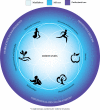Modifiable disease risk, readiness to change, and psychosocial functioning improve with integrative medicine immersion model
- PMID: 22314632
- PMCID: PMC3644485
Modifiable disease risk, readiness to change, and psychosocial functioning improve with integrative medicine immersion model
Abstract
Background: Stroke, diabetes, and coronary heart disease (CHD) remain leading causes of death in the United States and are largely attributable to lifestyle behaviors. Integrative medicine can provide a supportive partnership that focuses on improving health by identifying and implementing lifestyle changes based upon personal values and goals.
Objective: This prospective observational study was designed to assess the effectiveness of an integrative medicine intervention on modifiable disease risk, patient activation, and psychosocial risk factors for stroke, diabetes, and CHD.
Design: Sixty-three adults participated in a 3-day comprehensive, multimodal health immersion program at Duke Integrative Medicine, Duke University Medical Center, Durham, North Carolina. Participants received follow-up education, physician support, and telephonic health coaching between the immersion program and the endpoint 7 to 9 months later.
Primary outcome measures: Psychosocial functioning, readiness to change health behaviors, and risk of developing diabetes, stroke, and CHD were assessed at baseline and endpoint.
Results: Although cardiac risk remained unchanged (P = .19) during the study period, risk of diabetes (P = .02) and stroke (P < .01) decreased significantly. Perceived stress remained unchanged, but improvements were seen in mood (P < .05) and relationship satisfaction (P < .004). Patients became more activated towards self-management of health (P <.001), endorsed greater readiness to change health behaviors (P <.01), and reported increased aerobic exercise (P <.001) and stretching (P = .006) following the intervention.
Conclusion: An integrative health model can help patients become more engaged in self-management of health and support them in making and maintaining healthy lifestyle changes. These findings provide support for use of an integrative health model in adult disease risk reduction.
Figures


References
-
- Lloyd-Jones D, Adams R, Carnethon M, et al. Heart disease and stroke statistics—2009 update: a report from the American Heart Association Statistics Committee and Stroke Statistics Subcommittee. Circulation. 2009;119(3):e21–e181. - PubMed
-
- Van Dam RM, Rimm EB, Willett WC, Stampfer MJ, Hu FB. Dietary patterns and risk for type 2 diabetes mellitus in U.S. men. Ann Intern Med. 2002;136(3):201–209. - PubMed
-
- Eyre H, Kahn R, Robertson RM, et al. American Cancer Society. American Diabetes Association. American Heart Association Preventing cancer, cardiovascular disease, and diabetes: a common agenda for the American Cancer Society, the American Diabetes Association, and the American Heart Association. Stroke. 2004;35(8):1999–2010. - PubMed
-
- Kromhout D, Menotti A, Kesteloot H, Sans S. Prevention of coronary heart disease by diet and lifestyle: evidence from prospective cross-cultural, cohort, and intervention studies. Circulation. 2002;105(7):893–898. - PubMed
-
- American Heart Association Nutrition Committee. Lichtenstein AH, Appel LJ, Brands M, et al. Diet and lifestyle recommendations revision 2006: a scientific statement from the American Heart Association Nutrition Committee. Circulation. 2006;114(1):82–96. - PubMed
Publication types
MeSH terms
Grants and funding
LinkOut - more resources
Full Text Sources
Medical
